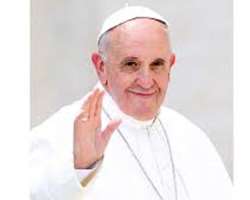Pope tasks media on peace

Pope Francis Sunday urged the media to promote global peace amid marginalisation, poverty and conflicts.
He noted that in the midst of these crises, the media could help people to feel closer to one another, creating a sense of unity of the human family which could in turn inspire solidarity and serious efforts to ensure a more dignified life for all.
In a massage to mark the 2014 World Communication Day, Pope Francis observed that good communication would help people to grow closer, to know one another better and ultimately, to grow in unity.
He said: 'The walls which divide us can be broken down only if we are prepared to listen and learn from one another. We need to resolve our differences through forms of dialogue which help us grow in understanding and mutual respect. A culture of encounter demands that we be ready not only to give, but also to receive. The media can help us greatly in this, especially nowadays, when the networks of human communication have made unprecedented advances. The Internet, in particular, offers immense possibilities for encounter and solidarity. This is something truly good, a gift from God.
'We are living in a world which is growing ever 'smaller' and where, as a result, it would seem to be easier for all of us to be neighbours while developments in travel and communications technology are bringing us closer together and making us more connected, even as globalisation makes us increasingly interdependent.
He said: 'Nonetheless, divisions, which are sometimes quite deep, continue to exist within our human family. On the global level we see a scandalous gap between the opulence of the wealthy and the utter destitution of the poor. Often we need only walk the streets of a city to see the contrast between people living on the street and the brilliant lights of the store windows. We have become so accustomed to these things that they no longer unsettle us. This is not to say that certain problems do not exist.'
According to the cleric, the speed with which information is communicated exceeds our capacity for reflection and judgement, and this does not make for more balanced and proper forms of self-expression.
He noted that the variety of opinions being aired could be seen as helpful, but it also enabled people to barricade themselves behind sources of information which only confirmed their own wishes and ideas, or political and economic interests.
'The world of communications can help us either to expand our knowledge or to lose our bearings. The desire for digital connectivity can have the effect of isolating us from our neighbours, from those closest to us. We should not overlook the fact that those who for whatever reason lack access to social media run the risk of being left behind. While these drawbacks are real, they do not justify rejecting social media; rather, they remind us that communication is ultimately a human rather than technological achievement. What is it, then, that helps us, in the digital environment, to grow in humanity and mutual understanding?
'We need to recover a certain sense of deliberateness and calm. This calls for time and the ability to be silent and to listen. We need also to be patient if we want to understand those who are different from us. People only express themselves fully when they are not merely tolerated, but know that they are truly accepted. If we are genuinely attentive in listening to others, we will learn to look at the world with different eyes and come to appreciate the richness of human experience as manifested in different cultures and traditions. We will also learn to appreciate more fully the important values inspired by Christianity, such as the vision of the human person, the nature of marriage and the family, the proper distinction between the religious and political spheres, the principles of solidarity and subsidiarity, and many others.
'Whenever communication is primarily aimed at promoting consumption or manipulating others, we are dealing with a form of violent aggression like that suffered by the man in the parable, who was beaten by robbers and left abandoned on the road', he added.
